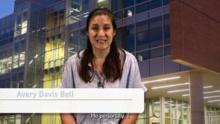news
Postdocs Share Lessons Learned Throughout Academic Journey
Primary tabs
The experiences of those who have overcome barriers and unexpected roadblocks can serve as guiding beacons as you navigate your own academic journey. Georgia Tech postdoctoral scholars (postdocs), Avery Davis Bell, Ida Su, and Nicole Hellessey share how they navigated different challenges during their educational career and how these experiences have shaped their perspectives on life and work.
Prioritize Your Well-Being: Avery Davis Bell Makes Work-Life Work for Her
“I developed a repetitive strain injury in my wrist, which was debilitating, and I took it on as a second part-time job,” said Avery Davis Bell, postdoc in the College of Sciences. “I needed to figure out how to make my work life work for me instead of fixing the body I have.”
Bell decided she had to be open with her prospective postdoc advisor about her injury. She let them know from the beginning that she was not going to work based on hours. When Bell explained her situation and her emphasis on protecting her health, she was met with support from everyone. She learned that, at the end of the day, what mattered was doing good work and not how many hours it took to get there.
Bell’s injury turned into a valuable lesson she imparts to students.
If you have interest in science, you can make it work for you,” said Bell. “You do not have to adapt to the prevailing model. Science is better for having you in it.
Advocate for Yourself: Ida Su Navigates Cultural and Communication Challenges
During her Ph.D. qualifying exams, Ida Su, postdoc in the College of Engineering, encountered challenges due to her hearing disability and language barrier as an international student from Taiwan.
“I could see their lips moving, but I couldn’t hear what they were saying clearly,” said Su. “I didn’t have the courage to speak up for myself.”
At that time, Su felt hopeless. With support and encouragement from her Ph.D. advisor and her Ph.D. advisory committee, however, Su sought medical help for her hearing disability and her communication improved.
As Su progressed in her studies, navigating the differences between Eastern and Western cultures still proved difficult.
“I tend to be very shy. I tend to let people, especially senior people, tell me what to do and make decisions for me,” said Su. “Because of these cultural differences, the initial stage of my Ph.D. study was kind of rough.”
Observing these dynamics, Su’s Ph.D. advisor explained the differences between the cultures. They encouraged her to start speaking up for herself.
“Because of their advice, I was able to choose my postdoc advisor based on my research interests, and I was able to follow my passion,” said Su.
A Nonlinear Journey is OK: Nicole Hellessey Navigates Parenthood and Career Choices
“When I finished my bachelor’s degree, I took 18 months off because I was unexpectedly pregnant,” said Nicole Hellessey, postdoc in the College of Sciences.
Hellessey spent the next 18 months after graduation reviewing her options and deciding if she should get a job or go back into academia and research.
“I was talking to a friend who was going back to university themselves, and they said, ‘You should do it. Who cares? You will make it work,’” said Hellessey. “I went back and did my master’s and go a job in the salmon industry afterwards.”
Hellessey worked in the industry for two years before deciding to obtain her Ph.D., and eventually a postdoc.
These postdocs’ experiences are a reminder that your journey is your own, and success does not follow a set path. Evaluate what matters to you, and find support in family, friends, peers, and mentors.
The Postdoc Visibility Project is a collaboration between the Office of Graduate Education and Postdoctoral Services, the School of Chemistry and Biochemistry, and Tech’s postdocs. Our goal is to highlight the contributions of postdocs to the research enterprise, humanize the postdoc experience, and connect postdocs to each other. To achieve this, we will share three spotlight articles and accompanying video interviews throughout the Spring 2024 semester. This is the second installment of the Project. View the first spotlight article and video, “Myth vs. Reality: Essential Facts to Know about Postdocs.”
This work is supported in part by the National Sciences Foundation Mathematical and Physical Sciences divisions ASCEND program under grant award number CHE-2138107.
Status
- Workflow Status:Published
- Created By:Sara Franc
- Created:03/08/2024
- Modified By:jhunt7
- Modified:03/27/2024
Categories
Keywords


